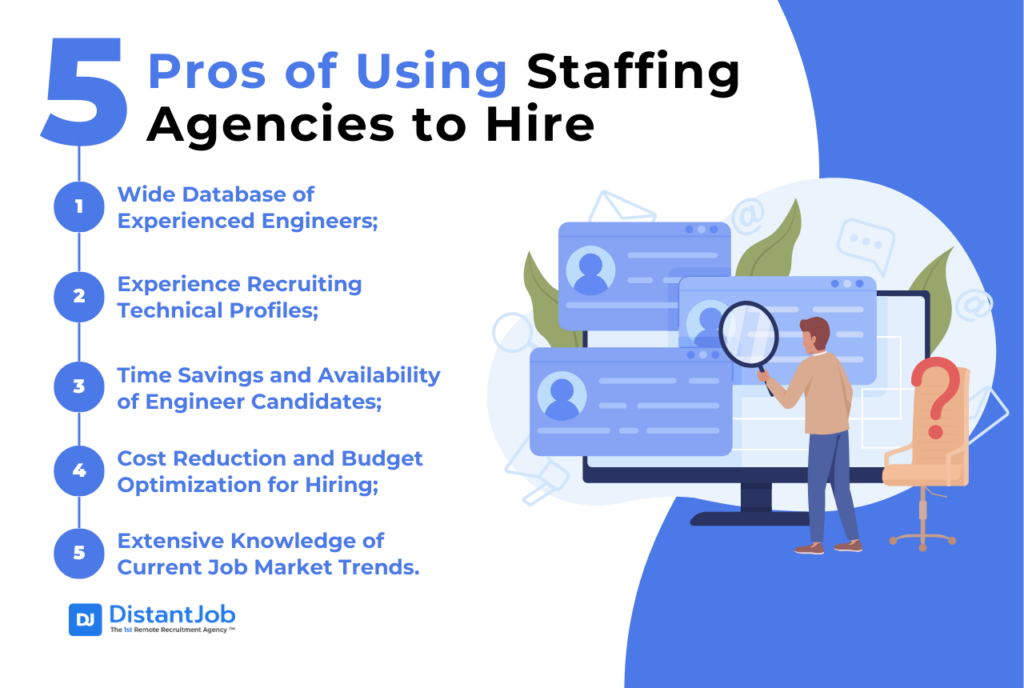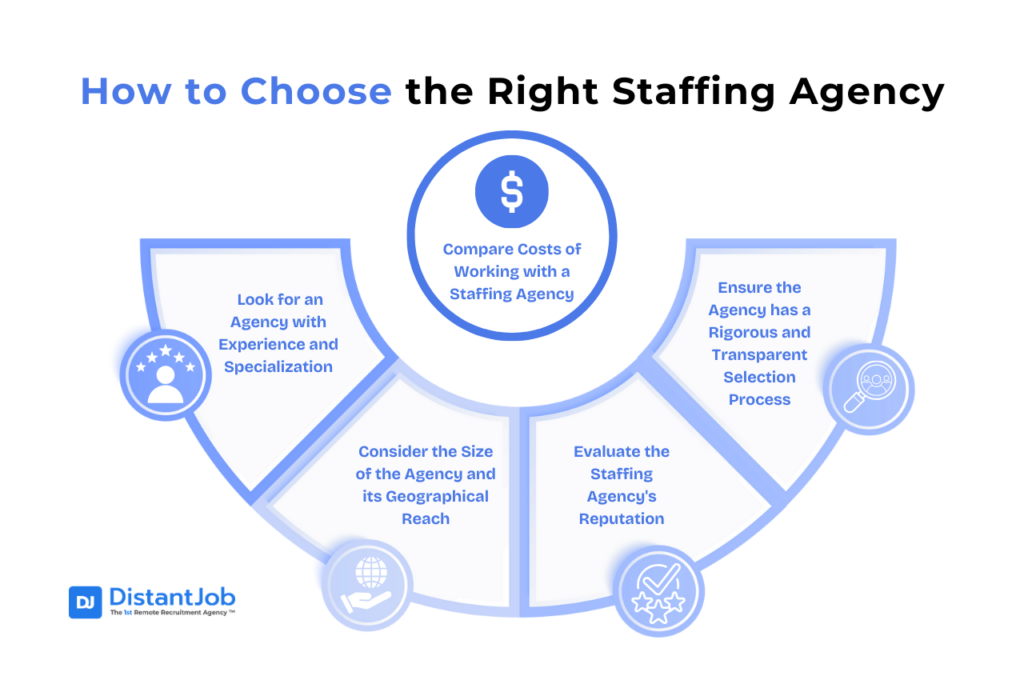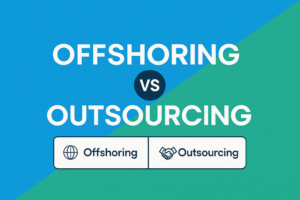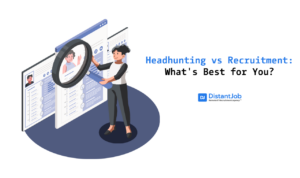A staffing agency is a third-party company that finds, screens, and places workers on behalf of employers looking to fill open positions. Also called a staffing firm, recruitment agency, or employment agency, it acts as an intermediary, connecting businesses that need talent with candidates who have the right skills and experience.
Staffing agencies handle most of the hiring process: writing job descriptions, sourcing candidates, conducting interviews, running background checks, and managing onboarding paperwork. Some also act as the employer of record, meaning they handle payroll, taxes, and benefits for the workers they place.
According to the American Staffing Association (ASA), U.S. staffing companies employ an average of 2.2 million temporary and contract workers per week. And a ManpowerGroup report found that 69% of U.S. employers struggle to find the right mix of skills, which is exactly why more businesses are turning to staffing agencies to bridge the gap.
Career Builder revealed that 77% of millennial clients plan to increase their use of staffing companies in the next five years. In essence, staffing agencies can offer you two key things; their experience in recruiting and their database of candidates. This can help speed up the hiring process and give you fewer false starts interviewing the wrong person.
In this guide, we break down how staffing agencies operate, what they cost, the different types available, and how to choose the right one for your needs.
How Does a Staffing Firm Operate?
A staffing firm is a company you hire to find, vet, and match candidates with your business.
Here’s how the partnership process looks like:
1. You Contact the Agency
The first step is to let the agency know that you have a vacancy coming up. They will want some basic details of the role, including responsibilities, any requirements you have, and your timeline for finding the right person.
2. Job Description
Placement agencies will develop your requirements into a job description that they will use to advertise your vacancy. Your internal job description can be used as a basis for that, but a good recruiter will want to rewrite it to appeal to the right candidates.
3. The Role is Advertised
This is where the agency really earns their money as they put your advert in front of the right candidate.
This could be through:
– Calling potential candidates who are registered with them – most agencies maintain databases with hundreds of candidates.
– Adding a listing to Jobs boards
– Promoting the opening via their social media
– Head-hunting suitable candidates
4. They Create the Shortlist
The agency will then vet any candidates who apply, checking them against the job profile. A good agency will also have gained a grasp of your company culture and the personality types at play, so they’re presenting you with candidates who really fit.
It’s at this point any vetting needed will take place, for example, checking skills or certifications.
5. You Decide Who to Interview
You then get to review the shortlist and decide which candidates you’d like to talk to more fully. You let the agency know, and they make the arrangements.
6. Make a Decision
Once you’ve made your choice, you let the agency know, and they will talk to all the candidates, both successful and unsuccessful, and give them feedback on what went well and what didn’t.
7. HR
You’ll need to do all the relevant paperwork to get the new employee on the books. If you’re hiring a remote employee this can be complicated by international tax laws, so your staffing agency may take care of this for you by becoming the ‘employee of record’.
8. Onboarding
The agency will then support you through the onboarding process, making sure that you have a seamless experience with your new hire.
Types of Staffing Agencies
Not all staffing agencies work the same way. The type you choose depends on what kind of hire you need, how long you need them, and what industry you’re in.
Temporary Staffing Agencies
These agencies provide workers for short-term assignments with a defined start and end date. The staffing agency employs the worker and handles their payroll, taxes, and benefits. Temporary staffing is common in warehousing, retail, hospitality, and manufacturing industries with seasonal demand spikes.
Temp-to-Hire Agencies
A temp-to-hire arrangement starts as a temporary placement but gives the employer the option to convert the worker into a permanent employee after a trial period (usually 3 to 6 months). This lets both sides evaluate the fit before making a long-term commitment.
Direct Hire (Permanent Placement) Agencies
These agencies recruit candidates for full-time, permanent positions. The worker goes directly onto the employer’s payroll from day one. The agency charges a one-time placement fee, typically 15–30% of the candidate’s first-year salary.
Specialized / Niche Staffing Agencies
These agencies focus on specific industries or roles. An IT staffing agency, for example, recruits software developers, data engineers, and cybersecurity specialists. Other niches include healthcare staffing, legal staffing, accounting, and executive search. Specialized agencies tend to deliver more precise candidate matches because their recruiters understand the technical requirements of the roles they fill.
Remote Staffing Agencies
Remote staffing agencies source talent globally and place them as full-time remote workers within your team. Unlike traditional outsourcing, the candidate works exclusively for you; they just happen to be located in another country. These agencies typically handle international compliance, payroll, and employer-of-record services, making it easy to hire across borders without setting up a foreign entity.
Companies that partner with remote staffing agencies often save 40–60% on total employment costs while accessing a wider talent pool.
Staffing Agency vs. Temp Agency vs. Recruitment Agency
These three terms are often used interchangeably, but there are practical differences worth understanding.
A staffing agency is the broadest term. It covers temporary, temp-to-hire, and permanent placements. Staffing agencies serve businesses across the full spectrum of hiring needs.
A temp agency (or temporary employment agency) is a subset of staffing. Temp agencies specialize specifically in short-term, temporary workers. If you need someone for a two-week assignment or a seasonal rush, a temp agency is the typical choice.
A recruitment agency (also called a recruiting firm or search firm) typically focuses on permanent, direct-hire placements. Recruitment agencies tend to invest more time per search, target hidden talent, and conduct deeper vetting. Executive search firms and headhunters fall into this category.
In practice, many modern agencies offer all three services. The key distinction is emphasis: temp agencies prioritize speed and volume, recruitment agencies prioritize fit and long-term retention, and full-service staffing agencies offer a mix of both.
How Much Does a Staffing Agency Cost?
Staffing agency fees vary depending on the type of placement, the role’s seniority, and the industry. Here’s a general breakdown:
Temporary and Contract Placements
For temporary workers, staffing agencies charge a markup on the worker’s hourly wage, typically between 25% and 75%. This markup covers the agency’s costs (recruiting, screening, overhead) plus employer-side taxes, workers’ compensation insurance, and any benefits offered to the worker.
For example, if a temporary worker earns $30 per hour, the agency might bill the employer $42–$52 per hour depending on the markup rate.
Permanent / Direct Hire Placements
For permanent placements, agencies charge a one-time fee calculated as a percentage of the candidate’s first-year annual salary. This typically ranges from 15% to 30%, depending on the role’s complexity and seniority.
For a role with a $100,000 annual salary, the placement fee would be $15,000–$30,000.
Who Pays the Staffing Agency: the Employer or the Candidate?
The employer always pays the staffing agency’s fees. A legitimate staffing agency will never charge the job candidate for placement services. If an agency asks a candidate for payment, that is a red flag.
Workers placed by a staffing agency receive their agreed-upon wage. The markup or placement fee is an additional cost borne entirely by the hiring company.
5 Benefits of Using a Staffing Agency
Why do companies work with staffing agencies instead of hiring in-house? According to Gitnux, 90% of businesses worldwide use talent acquisition agencies to some extent.
Here’s why:

1. Access to a Wider Talent Pool
Staffing agencies maintain extensive networks of active and passive candidates. This is especially valuable for specialized roles; an IT staffing agency, for example, can tap into networks of software developers proficient in specific frameworks (React, Angular, Node.js), cloud platforms (AWS, Azure, GCP), or emerging fields like AI/ML engineering. These candidates are often employed elsewhere and not visible on public job boards.
2. Experience Recruiting Technical Profiles
Staffing agencies know how to identify the most suitable candidates for each position, understand the best way to evaluate soft and hard skills, analyze candidates’ previous experience, and determine if they fit the organization’s culture.
This means that a company can feel confident that the agency will send only ideal candidates not just for the project but also for the company’s culture and long-term expectations.
3. Time Savings and Availability of Engineer Candidates
Did you know that the time-to-hire rate for tech roles is 50 days? This is without considering onboarding and documentation.
While the company continues its daily operations, prioritizing tasks and activities, the staffing agency can handle the entire candidate selection process. From posting the job offer to making the final selection.
If the agency already has suitable profiles, it will only be a matter of weeks to conduct the necessary technical interviews to choose the ideal candidate.
4. Cost Reduction and Budget Optimization for Hiring
If you compare the financial cost, time, and resources it will take you to find and hire technology and development professionals, it is much more economical to let the staffing agency handle these tasks.
This way, you can optimize your hiring budget while ensuring you get suitable profiles.
5. Extensive Knowledge of Current Job Market Trends
Staffing agencies possess in-depth knowledge of the current technology job market, including emerging roles, skill demands, and industry-specific requirements. This expertise allows them to provide valuable insights that directly benefit your hiring process.
By leveraging this knowledge, agencies can:
- Identify emerging skill sets that may be crucial for your projects.
- Advise on market-driven retention strategies.
- Provide insights on industry-specific hiring challenges and solutions.
This comprehensive understanding of market trends enables agencies to streamline your recruitment process, ensuring you stay competitive in attracting and retaining the best tech talent for your specific needs.
How to Choose the Right Staffing Agency

When choosing an appropriate staffing agency, it is crucial to consider several factors to ensure that the agency aligns with your company’s specific needs. Here are some key points to keep in mind:
1. Look for an Agency with Experience and Specialization
First, look for an agency with experience and specialization in your industry. This is particularly important in technical or highly specialized fields, such as technology or engineering.An agency with experience in your sector will have a more profound understanding of the skills and qualifications required for the roles you’re looking to fill.
2. Consider the Size of the Agency and its Geographical Reach
The size and geographical reach of a staffing agency can significantly influence its effectiveness in meeting your hiring needs. Large agencies typically have access to a wider pool of candidates, while smaller or boutique agencies often provide more personalized service and focused attention to your specific requirements.
Agencies with global reach offer significant advantages when hiring remote workers or expanding internationally. Conversely, local or regional agencies often have deeper connections within specific markets.
These are the pros and cons of global versus local staffing agencies:
- Global Agencies:
- Advantage: Access to diverse, international talent pools
- Benefit: Ideal for remote hiring and global expansion
- Drawback: May lack deep local market knowledge
- Local/Regional Agencies:
- Strength: Deep connections in specific markets
- Advantage: Better for location-specific hires
- Benefit: Understanding of local culture and job market nuances
For instance, a global agency might excel at finding engineering candidates with niche skills in emerging technologies, regardless of their location. The selection processes and strategies can vary significantly based on the agency’s size and reach, so it’s important to choose one that aligns with your specific hiring goals and geographical requirements.
3. Evaluate the Staffing Agency’s Reputation
It’s also indispensable to evaluate the agency’s reputation. How can you do this?
Look for testimonials from previous clients, review their success stories, and, if possible, talk to other companies that have used their services.
A staffing agency with a solid reputation in the market is more likely to offer quality service and consistent results that you can turn to whenever you need to hire a new candidate.
4. Ensure the Agency has a Rigorous and Transparent Selection Process
Any staffing agency specializing in recruiting engineering candidates should clearly explain how they evaluate and select candidates and how they ensure that these candidates not only fit the skills required for the project.
They should also guarantee that they match your company’s culture.
5. Compare Costs of Working with a Staffing Agency
Carefully compare the costs and fee structures of different staffing agencies.
Make sure you understand all associated charges, including initial fees, placement commissions, and any additional costs for complementary services, in detail.
Also, consider how these costs align with the quality of service offered and the potential value that each agency can bring to your long-term hiring process.
By considering these factors, you’ll be better positioned to choose a staffing agency that meets your immediate hiring needs and becomes a valuable partner for your company’s long-term growth.
Common Misconceptions About Staffing Agencies
If you’re considering working with a recruitment agency, then you may have heard some of the common misconceptions about staffing agencies – things like this:
“They Don’t Care”
You might have heard those agencies just want to get their commission and don’t really care about the quality of their clients.
There might still be some big companies that rely on churn rather than quality, but smaller boutique agencies rely on building a reputation for quality, and the only way they can achieve that is by going above and beyond for you every time.
“It’s Too Expensive”
As we’ve discussed above, there is a financial cost to using a recruitment agency, but there is also a cost to doing it yourself.
While the average cost of hiring a new employee is $4,000, the cost of hiring the wrong person can be devastating to morale and deadlines.
Getting it right the first time is much cheaper.
“Low-Quality Candidates”
Have you ever had a bad experience with a recruiter? Been direct messaged on LinkedIn for a role you’re not remotely qualified for, or been sent a standard email out of nowhere when you’re not looking for work? Some recruiters try and play a numbers game, hoping that if they throw out enough bait, they’ll get a bite.
These are the rare exceptions, though. For most recruiters, and especially the smaller companies, their reputation is based on their ability to find you the right person. The CVs you get as a shortlist should be the cream of the crop.
How DistantJob Works as a Staffing Agency
DistantJob is a remote staffing agency with over 15 years of experience connecting U.S. and Canadian companies with pre-vetted software developers worldwide.
Here’s what makes our approach different:
We headhunt, not post-and-pray. Our recruiters actively source senior developers who are already employed and performing well. We don’t rely on job board applications.
You see 3 candidates, not 30. We handle all sourcing, screening, technical assessments, and cultural fit evaluations. You only see the top 3 candidates who match your exact requirements.
We handle global compliance. As an Employer of Record (EOR), we manage international contracts, payroll, tax withholdings, and local labor law compliance in the candidate’s country. You pay one consolidated invoice.
Average time to hire: 14 days. We typically present the first batch of interview-ready candidates within 7–10 business days.
90-day replacement guarantee. If a placement doesn’t work out, we restart the search at no additional cost.
If you’re looking for a staffing agency that delivers quality over quantity and specializes in remote tech talent, schedule a discovery call or start hiring now.
FAQ
The disadvantages of staffing agencies include potential high costs for employers, as they often charge fees for their services, reducing the overall hiring budget. Additionally, there may be a lack of direct control over the selection process, leading to potential mismatches between the candidate’s skills and the employer’s needs.
The purpose of a staffing agency is to act as an intermediary between employers and job candidates. The agency handles recruiting, screening, and placing qualified workers into temporary, temp-to-hire, or permanent positions, saving the employer time, reducing hiring risk, and providing access to a wider talent pool
There are two types of staffing agencies: Generalists and specialists. Generalists offer recruitment services to any business, while specialists tend to work with a particle sector, for example, care staff or IT professionals.
A staffing agency provides temporary, temp-to-hire, and permanent placement services across all employment types. A recruitment agency typically focuses specifically on permanent, direct-hire placements and often targets passive, senior-level candidates. In practice, many agencies offer both services, and the terms are frequently used interchangeably.
Timelines vary by role complexity and agency efficiency. For general positions, agencies can often present candidates within a few days. For specialized or senior roles, expect 1–4 weeks. At DistantJob, our average time-to-hire for remote developers is 14 days.
Staffing agencies fill positions across virtually every industry and role level — from entry-level warehouse workers and administrative staff to senior software engineers, data scientists, and C-suite executives. Specialized agencies focus on specific sectors such as IT, healthcare, finance, legal, and engineering.





